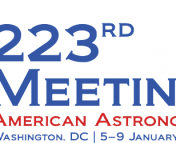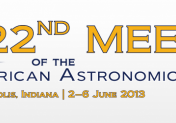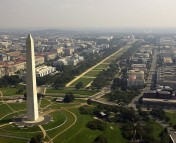The American Astronomical Society (AAS), the major North American astronomical professional association, has just released the latest edition of its newsletter online. The newletter is always a great resource for getting a broad overview of current events in the field, and there’s plenty of interesting content in this edition. Beware that the newsletter is potentially a little out of date, in that it was produced before the events of the recently concluded AAS meeting in Seattle.
I’ll pick a few interesting articles in the newsletter to mention here.
President Debra Elmegreen‘s column discusses some of the technical and political aspects of the next generation of major space telescopes and other observational facilities. In particular, she discusses the delayed James Webb Space Telescope (JWST), in some ways a succesor to the Hubble Space Telescope, and JWST’s own eventual quasi-successor, the Wide-Field Infrared Survey Telescope (WFIRST). WFIRST was given top billing in the recently published decadal survey where astronomers around the country joined in a discussion of where the field should go in the 2010s. JWST was similarly highlighted in the previous decadal review. Nobel prize winner John Mather and Jonathan Gardner of NASA’s Goddard Space Flight Center give a detailed update on JWST’s status and goals later in the newsletter.
Leila Belkora writes a guest piece detailing her own life experience as one possible career path outside of research. After she finished her Ph.D., she found success as a science writer and public educator.
Bethany Johns, AAS’s John Bahcall Public Policy Fellow in Washington, writes an interesting piece describing what the change in the US Congress will mean for funding of science (and astronomy in particular). She makes note of House majority leader Eric Cantor’s (R-Virginia) YouCut program, where citizens are allowed “to vote, both online and on your cell phone, on spending cuts that you want to see the House enact” – including on the National Science Foundation (NSF) budget. She points to some criticism of this project by Chris Mooney, “why does Rep. Smith think that this approach–let’s call it the ‘citizens Googling’ method–is a good way of evaluating research grants, as opposed to the merit-based peer review system?”




